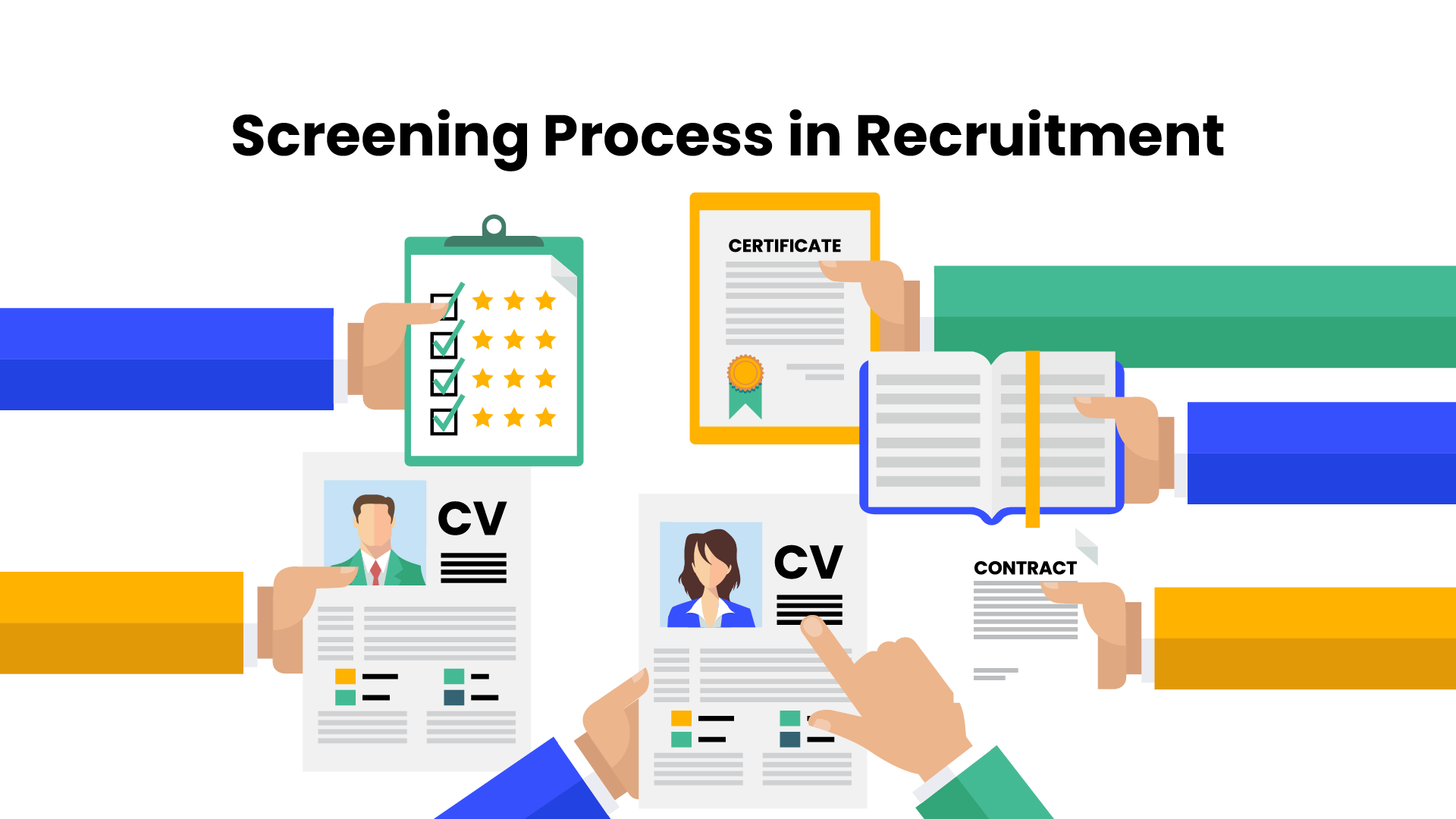
Learn the five most common screening methods, why they matter, and how the right tools help teams hire faster with clearer decisions.
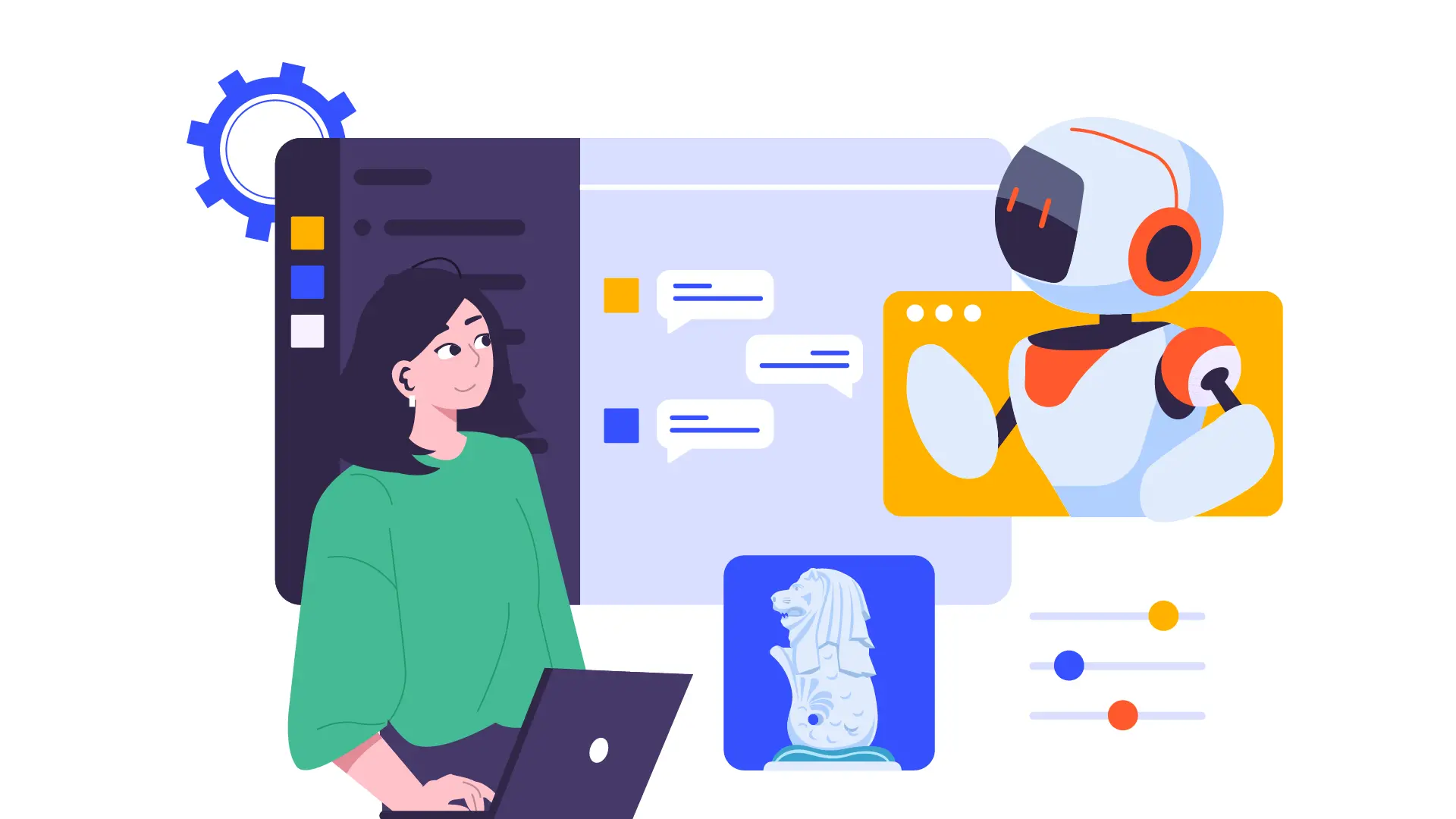
Recruiters in Singapore face a competitive and challenging landscape, with more job openings than qualified candidates, roughly 1.64 vacancies for every unemployed person. This talent shortage, combined with the pressure to hire quickly and efficiently, is pushing traditional recruitment methods to their limits. The solution isn't to work harder, but to work smarter.
In 2025, AI recruitment software has emerged as an essential solution.These tools go beyond simple applicant tracking systems (ATS), leveraging advanced algorithms to automate tedious tasks, improve candidate quality, and reduce hiring bias.
By offloading time-consuming tasks and helping to find the perfect fit amidst a skills mismatch, AI allows recruiters to focus on strategic human interaction and building strong talent pipelines.
This article will explore why AI recruitment software is now essential for recruiter productivity in Singapore, highlight five of the best AI recruiting platforms for 2025, and discuss what the future of AI in recruitment holds.
Let’s look deeper at why AI-powered hiring tools matter:
Real talent shortage is an issue confronting Singapore. As of 2024, 79 percent of the employers noted that they experienced difficulty recruiting talented individuals. This increased to 83 percent in early 2025 and as compared to the global average of 74 percent. Highest demand roles are in the areas of software engineering, data science, AI, and cybersecurity.
This is precisely where AI recruiting software becomes indispensable. In a market where top talent is scarce, companies cannot afford to waste time on manual, inefficient processes. AI tools are designed to solve this by automating candidate sourcing and screening, allowing recruiters to quickly identify a smaller, highly qualified pool of candidates.
By leveraging machine learning to analyze resumes and profiles for specific skills and experience, AI helps bridge the gap between job requirements and available talent, ensuring that companies can swiftly connect with the few ideal candidates in a highly competitive landscape.
AI tools speed up the process of recruitment since it can automate routine tasks like resume screening, sourcing candidates, scheduling an interview, and analyzing data. The less time recruiters do on such tasks, the more time they have on formulating strategy and on communication with individuals.
That speed is not just a nice-to-have in Singapore. It helps companies compete for top talent and fill roles more quickly. In such an environment, it’s a necessity.
See Also: Time to Hire vs Time to Fill: Definition, Formula, and How to Improve Hiring Speed
AI helps reduce manual bias in candidate screening by focusing on skills and competencies instead of factors like age, gender, or ethnicity. This is especially relevant because diversity and inclusion (D&I) are important in Singapore’s workforce.
A longitudinal study in the Journal of Applied Psychology found that AI-based assessments cut hiring bias by 25%, showing how these tools can support a more inclusive workplace.
Hiring in Singapore is expensive. According to HRSINGAPORE, recruitment agency fees typically range from 15-25% of a candidate’s annual salary. Job board postings and advertising usually cost between SGD 300 and SGD 1,500 per posting while employee referral incentives can range from SGD 500 to SGD 2,000 per successful hire.
AI software helps reduce these expenses by automating manual tasks and cutting reliance on agencies. In addition to lowering costs it also improves productivity and efficiency across the hiring process.
As explained by Workplace Asia Consulting, conventional performance reviews often rely on managers’ personal opinions, which can lead to bias and inconsistency. A data-driven AI approach shifts the focus to objective and measurable indicators for evaluating both individual and team performance.
Research published in the International Journal of Scholarly Research and Reviews shows that organizations applying data analytics in recruitment can raise the quality of hire by as much as 25%.
With the continuous local talent shortages, many companies in Singapore are looking for talents from regional markets such as Malaysia, Indonesia, India, and the Philippines.
With the help of AI-powered recruitment platforms, this search can extend even further to a global scale. AI enables large-scale sourcing across countries and languages, manages compliance with varying labor laws, and automates tasks like screening and shortlisting.
See Also: 7 Powerful Benefits of AI in Recruitment You Shouldn't Ignore
With the importance of AI in hiring now clear, the next step is choosing the right tools. The table below highlights some of the best AI recruitment tools in Singapore for 2025, each with its own strengths for different stages of the hiring process.
In the sections below, we’ll explore each tool in detail.
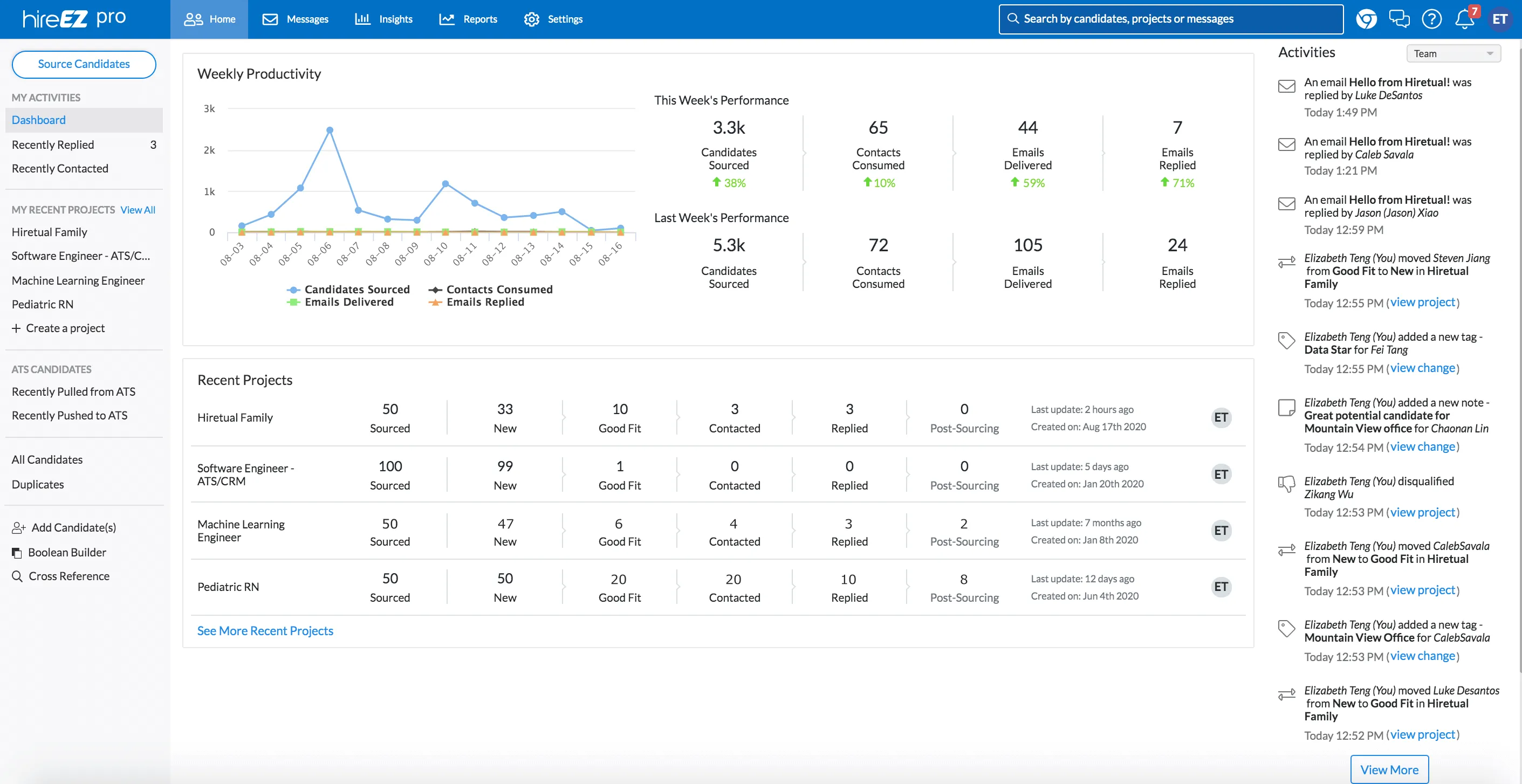
The hireEZ is an AI-assisted talent sourcing and engagement solution designed to assist recruiters to take more than traditional job posting and search proactively to find the best talent.
Rather than waiting on inbound applications, hireEZ facilitates active recruitment through searches of millions of profiles across more than 45 open web platforms, rediscovering candidates within your own database, and contacting them using personalized messaging.
Its Talent Data Cloud brings together sourcing, engagement, CRM, ATS integrations, and analytics and provides recruitment teams with a central hub to plan, execute and measure their hiring strategy. This method assists organizations to fill up vacant positions faster, attract passive candidates, and improve the quality of hire in a shorter time-to-fill.
Features:
Pricing:

Textio is an augmented writing platform powered by AI and helps recruiters to write job posts and recruiting materials that will attract the right candidates inclusively.
It goes beyond basic grammar checks by analyzing millions of hiring outcomes to estimate how certain words and phrases will work with various sets of candidates. This enables organizations to fine-tune job ads in terms of clarity, tone, and attractiveness to people of different backgrounds.
Textio does not leave anything to guesswork as it provides real-time suggestions that enhance the impact of every sentence. It highlights biased or ineffective wording, recommends more inclusive alternatives, and ensures your job descriptions stand out.
By integrating directly with ATS platforms, Textio fits seamlessly into existing recruitment workflows, which makes it easier to maintain consistent and high-quality job ads across all hiring teams.
Features:
Pricing:
Pricing is not public and it requires contacting sales. But average reported annual spend ranges from US $15,000–US $25,000 depending on usage and scale.
See Also: 13 AI-Powered Talent Acquisition Software Every Recruiter Should Know
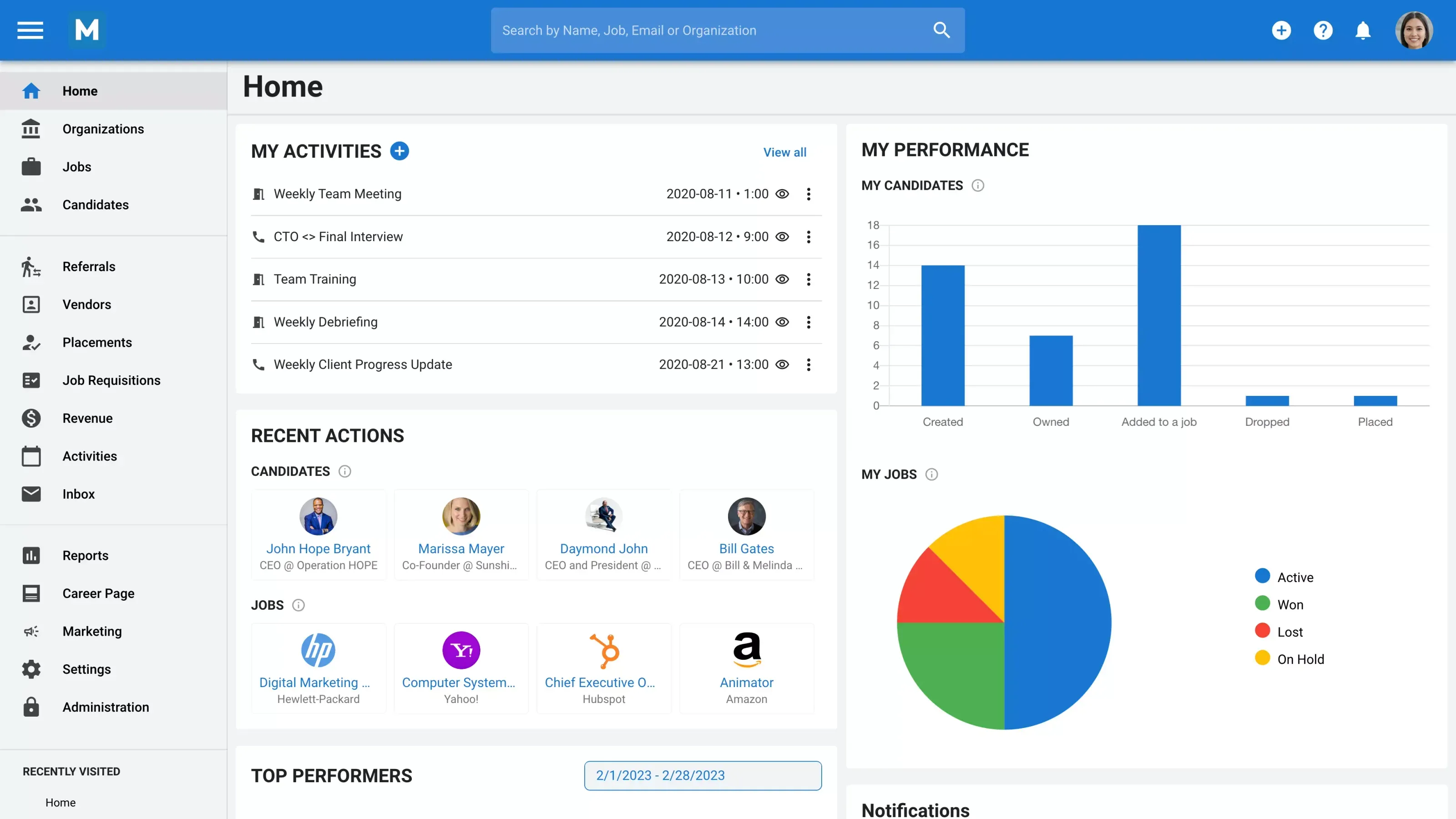
Manatal is a cloud-based Applicant Tracking System (ATS) enhanced with AI features to streamline and centralize the recruitment process.
It is built to serve both in-house HR teams and recruitment agencies with drag-and-drop pipeline, AI candidate scoring, automated resume parsing, and profile enrichment using publicly available sources.
Beyond tracking applications, Manatal allows recruiters to maintain relationships with clients, store candidate data, and use AI to highlight the most relevant ones to each position. By combining ATS, CRM, and AI capabilities in one platform, it reduces time-to-hire, improves candidate quality, and provides data-driven insights into recruitment performance.
Features:
Pricing:
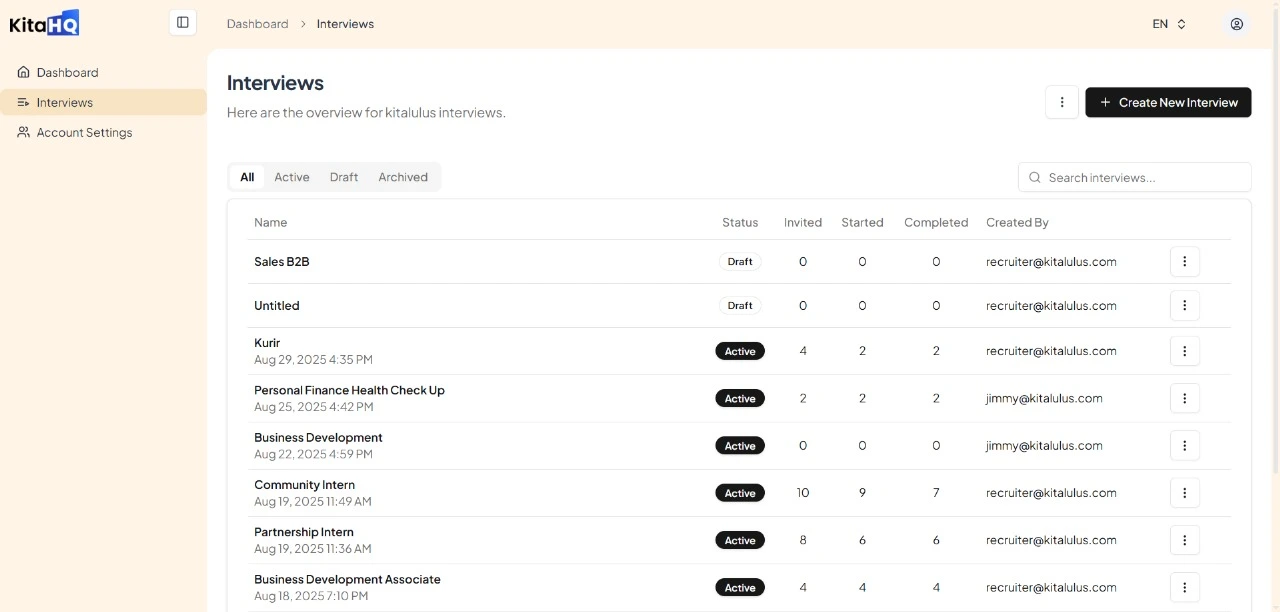
KitaHQ is an advanced video interviewing software powered by AI and automation. This platform is designed to transform how modern organizations conduct hiring
Through intelligent automation, the platform streamlines candidate screening and interview scheduling, provides structured and unbiased interviews, and generates comprehensive analytics including scores, transcripts, and video recordings.
This platform allows recruiters and hiring managers to make data-driven decisions more efficiently, promoting fairness and reducing time-to-hire by up to tenfold compared to traditional methods.
Its standout features include AI-generated job-specific questions and smart scheduling, enabling companies to quickly and objectively identify top talent even in high-volume recruitment scenarios.
Features:
Pricing:
Book a demo to see how it works
See Also: The Complete Guide to High Volume Recruiting (With Effective Tools)

TestGorilla is an AI-enhanced candidate assessment platform that enables organizations to evaluate applicants based on actual skills and abilities rather than resumes alone.
It offers a library of 400+ ready-made tests, along with customizable assessments, covering technical expertise, cognitive ability, language proficiency, and soft skills.
The platform supports various assessment formats, including coding challenges, video responses, and file uploads.
With automated scoring and instant result dashboards, TestGorilla allows recruiters to shortlist top candidates quickly, reduce bias, and improve hiring quality. It integrates seamlessly with popular ATS platforms which make it easy to embed objective assessments into any hiring workflow.
Features:
Pricing:
We are now still in the beginning era of AI recruitment. In the coming years, the advancements of AI will bring a more predictive, automated, and ethical recruitment process.
Below are some AI technologies that will shape the future of AI in Singapore’s recruitment.
Next-generation of AI will predict candidate performance and their long-term fit by analyzing past hiring outcomes, performance metrics, and market trends.
Automation is not just limited to screening the resumes but will move into more complex tasks like real-time interviews, qualification checks, and cultural fit analysis using advanced NLP and emotional intelligence models.
AI will deliver tailored job recommendations, messages, and interactions based on skills, preferences, and career goals that will provide more positive candidate experience.
Bias mitigation, algorithm audits, and inclusive design will remain key to ensuring AI hiring decisions are fair and equitable.
Singapore is enhancing governance through the Model AI Governance Framework, AI Verify toolkit, and updated National AI Strategy 2.0 to ensure responsible innovation that aligns with PDPA and fair hiring guidelines.
Singapore’s job market is moving fast and the talent gap isn’t closing on its own. AI recruitment tools give companies the speed, accuracy, and fairness they need to hire the right people quickly.
The key is to pick the right tools and put them to work. This will help you attract and keep top talent in a market where speed and precision make all the difference.
See Also: 15+ Essential Recruiting Metrics Every HR Leader Should Track
Recruitment in Singapore is moving at a pace that puts heavy pressure on employers. Companies are expected to fill roles quickly while keeping the process fair and precise.
For this reason, AI recruitment platforms have shifted from being optional to essential. They help employers reach wider talent pools, reduce bias, and speed up decision-making.
Among these options, KitaHQ is built to ease the most critical stage of hiring: the interview! It provides AI-generated questions, structured scheduling, and automated video sessions which will give a dependable process for recruiters and a consistent experience for candidates.
Built and developed in Singapore, KitaHQ is built for regional hiring needs while still supporting global reach. Moreover, KitaHQ supports both Malay and English language which makes it more practical for local teams while still fit for global use.
Book a demo of KitaHQ today and see why this Singapore’s owned AI-powered interview platform is the smarter way to transform your recruitment.
1. What compliance needs must Singapore recruitment software meet for legal adherence?
Recruitment tools in Singapore must follow several key regulations:
2. How is AI used in HR recruitment?
AI shows up across all parts of hiring. It can automate resume screening, schedule interviews, and run chatbots to answer candidate questions.
It can also help with predictive tasks like spotting which candidates might accept offers or perform well post-hire.
Some systems even host AI-led video interviews, generate interview questions tailored to job descriptions, and summarize responses with transcripts, scores, and insights for recruiters.
3. How can AI tools improve the recruiting process?
AI makes recruitment:
4. What is the best AI tool for HR?
The “best” AI tool for HR depends on your organization’s hiring priorities. Some popular options in 2025 include: